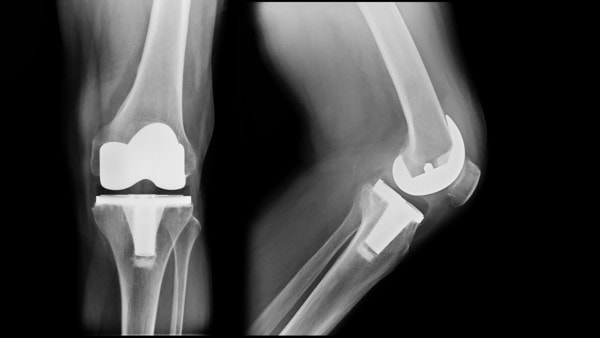Diabetes Impacts Knee Replacement Outcome

Total knee replacement on both knees. Tridsanu Thopet/Shutterstock
I’ve written a few times through the years about the single biggest preventable health factor that you can change which is type 2 diabetes. It’s a silent killer that impacts all aspects of your body’s functioning. Now, according to a new study, it also hurts your recovery from knee replacement. Let’s dig in.
What Is the Impact of Diabetes?
When you eat sugar or carbs, insulin is produced to help that sugar get into cells so it can be used for fuel. Only in modern times have we seen a new type of diabetes that happens in adults. Let’s dig in.
Concentrated sugar was a rare commodity in the ancient world. For example, things like bananas and pineapples, which have loads of sugar, were expensive to buy in Europe and the early US. In fact, in antebellum American homes, the expensive sugar was usually kept under lock and key in a Sugar Chest. Hence, up until recently, the average person was only exposed to lots of sugar as a rare luxury.
So what happens when you constantly expose yourself to loads of sugar and you take away all of that exercise we used to need to live and you have the wrong genes? Your body starts to produce too much insulin and this can burn out your pancreas, leading to type II or adult-onset diabetes (1). Once that happens, your risk for heart disease, stroke, and many other chronic or sudden death diseases goes sky high. So if there is one thing you can do to prevent disease, it’s to avoid becoming a type 2 diabetic.
Diabetes, Healing, and Stem Cells
We also know that diabetes mellitus (DM) has a huge negative impact on healing. For example, tendon healing after natural injury or surgery is delayed and stunted by DM (2). In fact, the healing of all orthopedic tissues like joints, ligaments, and bones is also negatively impacted (3). Finally, DM also impairs the ability of mesenchymal stem cells to participate in tissue healing (4).
Diabetes and Knee Replacement
A new meta-analysis reviewed many knee replacement studies to see if having type-2 DM impacted recovery (5). After data from 21 studies and more than seventeen thousand patients, the authors found that patients with DM had a worse outcome with regard to less improvement in function and more pain after knee replacement. This isn’t at all surprising given what we know about how this disease impacts the musculoskeletal system.
What Can You Do?
Given that type 2 DM has such a big impact on your bones, joints, ligaments, and tendons, the first thing you can do is to avoid this problem like the plague. Meaning, eat a low carb, high protein diet with loads of natural whole foods and avoid all processed food. Regular exercise 5-6 days a week is also key.
What if, because of an injury, you can’t exercise? What if you eat right, but because of your crummy genes, your doctor says you’re still heading towards type 2 DM? How can you clean up your act on short notice before a stem cell procedure or a knee replacement? Recent research has shown that using cycles of a fasting-mimicking diet can reverse the damage to the pancreas and help type 2 DM (6).
How can you do an easy, turn-key fasting-mimicking diet? I’ve recommended Prolon to my patients for years. All the food you can eat for a 5-day plan is in a big box. You simply eat everything in the first little box on day 1 and then the second and so on. Pretty easy. You can also just get an FMD book and do it yourself.
The upshot? Diabetes wreaks havoc on your bones, joints, ligaments, and tendons. If you have a procedure coming up, consider cleaning this up to maximize your outcome!
_____________________________________
References:
(1) Olokoba AB, Obateru OA, Olokoba LB. Type 2 diabetes mellitus: a review of current trends. Oman Med J. 2012;27(4):269-273. doi:10.5001/omj.2012.68
(2) Nichols AEC, Oh I, Loiselle AE. Effects of Type II Diabetes Mellitus on Tendon Homeostasis and Healing. J Orthop Res. 2020 Jan;38(1):13-22. doi: 10.1002/jor.24388. Epub 2019 Jun 24. PMID: 31166037; PMCID: PMC6893090.
(3) Stolarczyk A, Sarzyńska S, Gondek A, Cudnoch-Jędrzejewska A. Influence of diabetes on tissue healing in orthopaedic injuries. Clin Exp Pharmacol Physiol. 2018 Jul;45(7):619-627. doi: 10.1111/1440-1681.12939. Epub 2018 Apr 25. PMID: 29570835.
(4) Cassidy FC, Shortiss C, Murphy CG, et al. Impact of Type 2 Diabetes Mellitus on Human Bone Marrow Stromal Cell Number and Phenotypic Characteristics. Int J Mol Sci. 2020;21(7):2476. Published 2020 Apr 2. doi:10.3390/ijms21072476
(5) Na A, Oppermann LM, Jupiter DC, Lindsey RW, Coronado RA. Diabetes Mellitus Blunts the Symptoms, Physical Function, and Health-Related Quality of Life Benefits of Total Knee Arthroplasty: A Systematic Review With Meta-Analysis of Data From More Than 17,000 Patients. J Orthop Sports Phys Ther. 2021 Apr 19:1-54. doi: 10.2519/jospt.2021.9515. Epub ahead of print. PMID: 33870736.
(6) Cheng CW, Villani V, Buono R, Wei M, Kumar S, Yilmaz OH, Cohen P, Sneddon JB, Perin L, Longo VD. Fasting-Mimicking Diet Promotes Ngn3-Driven β-Cell Regeneration to Reverse Diabetes. Cell. 2017 Feb 23;168(5):775-788.e12. doi: 10.1016/j.cell.2017.01.040. PMID: 28235195; PMCID: PMC5357144.

NOTE: This blog post provides general information to help the reader better understand regenerative medicine, musculoskeletal health, and related subjects. All content provided in this blog, website, or any linked materials, including text, graphics, images, patient profiles, outcomes, and information, are not intended and should not be considered or used as a substitute for medical advice, diagnosis, or treatment. Please always consult with a professional and certified healthcare provider to discuss if a treatment is right for you.
